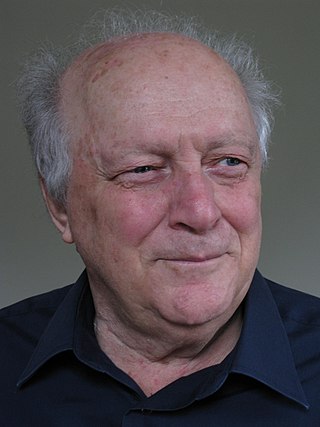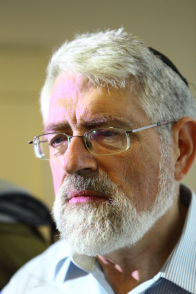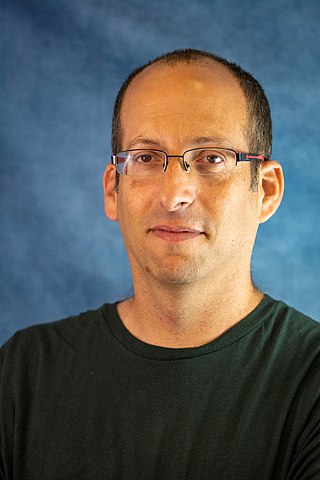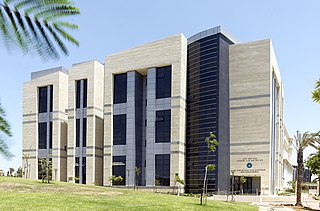Cognitive psychology is the scientific study of mental processes such as attention, language use, memory, perception, problem solving, creativity, and reasoning.

Cognitive neuroscience is the scientific field that is concerned with the study of the biological processes and aspects that underlie cognition, with a specific focus on the neural connections in the brain which are involved in mental processes. It addresses the questions of how cognitive activities are affected or controlled by neural circuits in the brain. Cognitive neuroscience is a branch of both neuroscience and psychology, overlapping with disciplines such as behavioral neuroscience, cognitive psychology, physiological psychology and affective neuroscience. Cognitive neuroscience relies upon theories in cognitive science coupled with evidence from neurobiology, and computational modeling.

Bar-Ilan University is a public research university in the Tel Aviv District city of Ramat Gan, Israel. Established in 1955, Bar Ilan is Israel's second-largest academic institution. It has about 20,000 students and 1,350 faculty members.
Daniel Lawrence Schacter is an American psychologist. He is William R. Kenan, Jr.'s endowed professor of psychology at Harvard University. His research has focused on psychological and biological aspects of human memory and amnesia, with a particular emphasis on the distinction between conscious and nonconscious forms of memory and, more recently, on brain mechanisms of memory and brain distortion, and memory and future simulation.
Nancy Coover Andreasen is an American neuroscientist and neuropsychiatrist. She currently holds the Andrew H. Woods Chair of Psychiatry at the Roy J. and Lucille A. Carver College of Medicine at the University of Iowa.
Creative visualization is the cognitive process of purposefully generating visual mental imagery, with eyes open or closed, simulating or recreating visual perception, in order to maintain, inspect, and transform those images, consequently modifying their associated emotions or feelings, with intent to experience a subsequent beneficial physiological, psychological, or social effect, such as expediting the healing of wounds to the body, minimizing physical pain, alleviating psychological pain including anxiety, sadness, and low mood, improving self-esteem or self-confidence, and enhancing the capacity to cope when interacting with others.
Marlene Behrmann is a Professor in the Department of Ophthalmology at the University of Pittsburgh. She was previously a Professor of Psychology at Carnegie Mellon University. She specializes in the cognitive neuroscience of visual perception, with a specific focus on object recognition.
The Cognitive Neuroscience Society (CNS) is an international academic society interested in multi-disciplinary approaches to cognitive brain function. Drawing primarily from the biological and psychological sciences, society members are involved in cognitive neuroscience research that attempts to integrate our understanding of the brain and mind.
Guided imagery is a mind-body intervention by which a trained practitioner or teacher helps a participant or patient to evoke and generate mental images that simulate or recreate the sensory perception of sights, sounds, tastes, smells, movements, and images associated with touch, such as texture, temperature, and pressure, as well as imaginative or mental content that the participant or patient experiences as defying conventional sensory categories, and that may precipitate strong emotions or feelings in the absence of the stimuli to which correlating sensory receptors are receptive.

Alva Noë is an American philosopher. He is Professor of Philosophy at the University of California, Berkeley. The focus of his work is the theory of perception and consciousness. In addition to these problems in cognitive science and the philosophy of mind, he is interested in analytic phenomenology, the theory of art, Ludwig Wittgenstein, enactivism, and the origins of analytic philosophy.
Michael Charles Corballis was a New Zealand and Canadian psychologist and author. He was Emeritus Professor at the Department of Psychology at the University of Auckland. His fields of research were cognitive psychology and cognitive neuroscience, encompassing visual perception, visual imagery, attention, memory, and the evolution of language.

Moshe Abeles is an Israeli brain researcher and neurophysiologist. He is emeritus professor at the Hebrew University in Jerusalem and at the Life Science Faculty of Bar Ilan University in Ramat Gan.

Haim Sompolinsky, is the William N. Skirball Professor of Neuroscience at the Edmond and Lily Safra Center for Brain Sciences, and a professor of physics at the Racah Institute of Physics at The Hebrew University of Jerusalem, Israel. He is also a visiting professor in the Center of Brain Science at Harvard University and the director of Harvard's Swartz Program in Theoretical Neuroscience. He is widely regarded as one of the leaders of theoretical neuroscience.

Abraham Zangen is an Israeli professor of neuroscience, head of the brain stimulation and behavior lab and chair of the psychobiology brain program at Ben-Gurion University of the Negev (BGU).
Social cognitive neuroscience is the scientific study of the biological processes underpinning social cognition. Specifically, it uses the tools of neuroscience to study "the mental mechanisms that create, frame, regulate, and respond to our experience of the social world". Social cognitive neuroscience uses the epistemological foundations of cognitive neuroscience, and is closely related to social neuroscience. Social cognitive neuroscience employs human neuroimaging, typically using functional magnetic resonance imaging (fMRI). Human brain stimulation techniques such as transcranial magnetic stimulation and transcranial direct-current stimulation are also used. In nonhuman animals, direct electrophysiological recordings and electrical stimulation of single cells and neuronal populations are utilized for investigating lower-level social cognitive processes.

Irene Mary Carmel Tracey is Vice-Chancellor of the University of Oxford and former Warden of Merton College, Oxford. She is also Professor of Anaesthetic Neuroscience in the Nuffield Department of Clinical Neurosciences and formerly Pro-Vice-Chancellor at the University of Oxford. She is a co-founder of the Oxford Centre for Functional Magnetic Resonance Imaging of the Brain (FMRIB), now the Wellcome Centre for Integrative Neuroimaging. Her team’s research is focused on the neuroscience of pain, specifically pain perception and analgesia as well as how anaesthetics produce altered states of consciousness. Her team uses multidisciplinary approaches including neuroimaging.
Hamutal Slovin is an Israeli neuroscientist and neurophysiologist who studies the visual system using optical imaging techniques. Slovin, is a professor at Bar-Ilan University, at the Gonda Multidisciplinary Brain Research Center. Her research focuses on deciphering the cortical mechanisms underlying visual and perceptual processing and their relation to eye movements, as well as reconstruction of visual stimuli from brain activity and artificial vision.

Izhar Bar-Gad is a full professor at the Leslie and Susan Gonda Brain Research Center at Bar-Ilan University. Bar-Gad is a researcher in the field of neurophysiology and neural computation. His main areas of research are information processing in the basal ganglia in a normal state and in various pathologies, such as Parkinson's disease and Tourette's syndrome.

The Leslie and Susan Gonda Multidisciplinary Brain Research Center is a multidisciplinary neuroscience institution, housed at Bar-Ilan University.
David Michael Greenberg is a psychologist, neuroscientist, and musician. He is best known for his contributions to personality psychology, social psychology, social neuroscience, music psychology, and autism.









